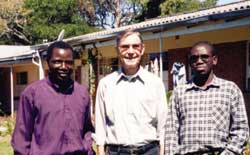I am here as servant
Accompanying the church in Africa
By Fr. James McGuire, S.F.M.
January 2004
Return to Table of Contents
Print Article
When I was preparing to leave for Africa, friends asked me why I would want to go there in the "afternoon" of my missionary life. They reminded me that Africa was a difficult place with many hardships such as poverty, sickness, the HIV/AIDS pandemic, famines and wars. This is the image that many Canadians have of Africa, along with the tourist attractions, such as vast plains with roaming elephants and lions, Victoria Falls and Mount Kilimanjaro.

Fr. Jim McGuire with Marist Brothers Frank (L) and Patrick (R). Fr. Jim serves as chaplain to their community and school. Dedza, Malawi.
Despite others' concerns, I still had a strong desire to join our Scarboro missionaries in Malawi. I was certain that God was calling me in that direction. People who have worked in Africa say that you must have Africa in your heart before you volunteer to go there.
I had the opportunity to visit our missionaries in Kenya and Malawi in 1999 when I served on Scarboro's General Council. I then proceeded to South Africa where Scarboro missionary Fr. Jack McIver is buried. The experience touched me deeply. I began to appreciate how much the African people have suffered over the centuries at the hands of outsiders (mostly Christians) from Europe and the Americas. The shameful slave trade, colonization, the exploitation of human beings and natural resources, are only a few examples.
I decided then that I would return to Africa one day if God permits, to share the Good News with this long-oppressed people.
The longing of people everywhere is for peace, freedom, justice, and equality. It is through dialogue and sharing as brothers and sisters that a new world is being born. The use of power and force only widens the gap that already separates the First World from those who are poor. We are confident that the 'sunrise' of the Gospel will bring light and hope to the entire world, and especially to the struggling continent of Africa.
Scarboro's mission to Malawi began in 1996. Bishop Joseph Zuza of Mzuzu invited Scarboro lay missionaries Ray and Beverley Vantomme to help set up a new facility for the mentally ill in Malawi. Beverley and Ray continue in this important project today.
Since Beverley and Ray's arrival seven years ago, five other Scarboro lay missioners have worked in Malawi, assisting with teaching, supporting the sick and disabled, collaborating in education about HIV/AIDS, and consoling the numerous victims and orphans of this dreaded disease. Briefly, our missionaries try to be present to the people, and to live in solidarity with them in their struggle.
In March 2003, Bishop Remi Ste-Marie, a Canadian and a Missionary of Africa, invited me to be part of the Church in Dedza, central Malawi. I was delighted to have this opportunity to return to missionary activity after serving for several years in our central administration. I also feel privileged to become part of our Scarboro mission team in Africa. We are now five, Beverley and Ray Vantomme, Mary Olenick, Betty Ann Martin, and myself.
As a priest missioner of the 21st Century, I believe that I am in Africa not to build churches and structures, as foreign missionaries did in the past. Rather, I am here as a servant, affirming and supporting the local Church, which is now well established. I have been asked to help as a spiritual director at St. Kizito junior seminary, to serve as chaplain for the Marist Brothers, and also for their secondary school, and to assist at a school for the education of Sisters. As well, I am learning Chechewa, the beautiful language of the majority of the country.
In these roles I can share my own understanding of the Gospel and of Christ's vision for the world, and I try to listen to the people's longing for a truly African Christianity. Together we pray and search for ways to make Christ more present in the hearts and culture of the Malawian people.
Return to Table of Contents
Print Article